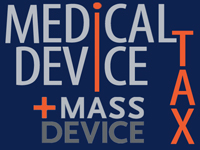
A substantial portion of surveyed medtech executives said the 2.3% medical device excise tax would lead to layoffs in the U.S., according to tax impact survey conducted by the Medical Imaging & Technology Alliance.
The respondents, executives from MITA members companies, said they expected to pay more than $287 million dollars in additional taxes next year.
In the survey 41% of participants anticipated job cuts that would impact manufacturing, sales, management and service workers. Nearly 30% also predicted a reduction in research and development funding.
"This burdensome tax is bad policy, and it has left manufacturers with little choice but to reduce their workforce and cut research and development – none of which create economic value or enhance patient care," MITA executive director Gail Rodriguez said in prepared remarks. "Such a large new tax jeopardizes thousands of American jobs in a difficult economic climate and poses a serious threat to innovation of new life-saving imaging technologies."
Rodriguez said the medical device industry supports more than 400,000 jobs in the U.S. and MITA urged Congress to take action immediately to prevent the tax and ultimately repeal it, he added.
Warnings of layoffs have been a big part of discussions about the medical device tax, and some companies have gone as far as citing the levy as the driver for job cuts ahead of implementation.
Device maker Welch Allyn earlier this year decided to cut 275 jobs, which amounts to 10% of its global workforce, in order to cut costs ahead of the levy. Medical device companies Zimmer (NYSE:ZMH), which laid off about 50, Hill-Rom Holdings (NYSE:HRC), which cut about 200, and Stryker (NYSE:SYK) which cut more than 100, have all cited the tax as a primary justification for layoffs.
The 2.3% excise tax on device sales, scheduled to go into effect in January 1st, 2013, was created by the Affordable Care Act. A group of 18 senators last week sent a sent a letter to Senate majority leader Harry Reid, requesting him to prevent the medical device tax from taking effect, according to the note.
MITA is part of a coordinated effort with other medtech industry groups attempting to lobby members of Congress to get action on the tax before it takes effect in January.
The group, which includes the Medical Device Manufacturers Assn. and AdvaMed., has organized D.C. fly-ins, showered the Beltway with ads and cultivated Democratic support for the cause, resulting in "tremendous progress" toward repeal, Moebius told MassDevice.com.
Medical device industry group AdvaMed has maintained that it’s "cautiously optimistic" that it can generate enough support to spur action on the tax before it hits, either through delaying implementation or outright appeal, but some industry players aren’t so sure.
Abbott Medical Optics president and former AdvaMed chairman James Mazzo told MassDevice.com last week that he believes a modification or delay of the tax is possible, but that seeking repeal of the tax simply isn’t realistic.

